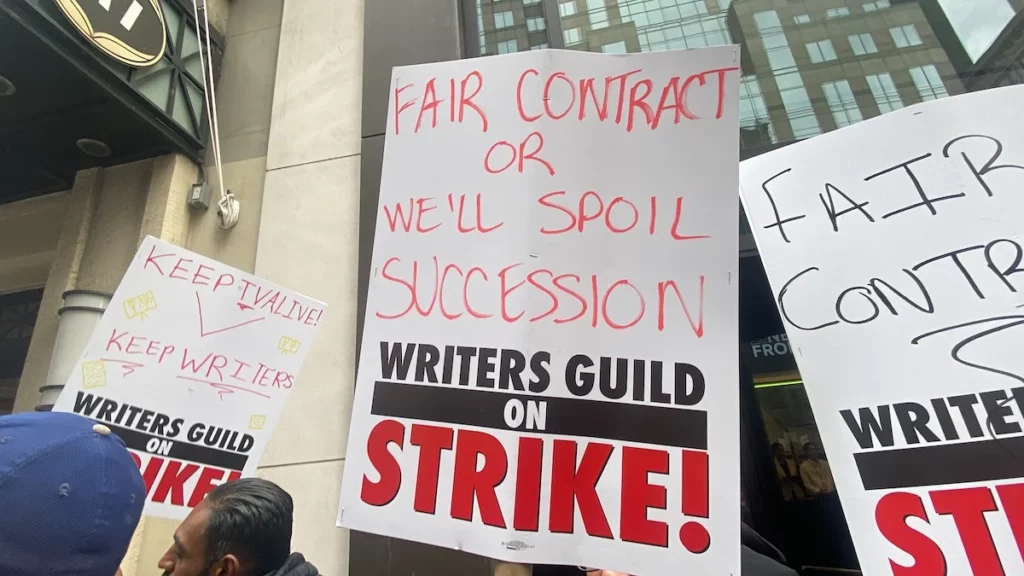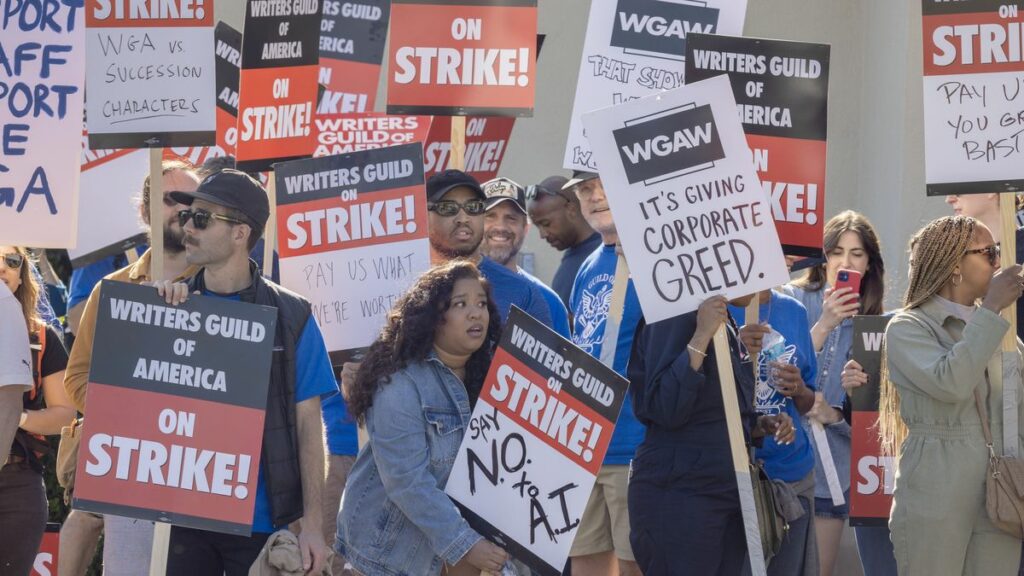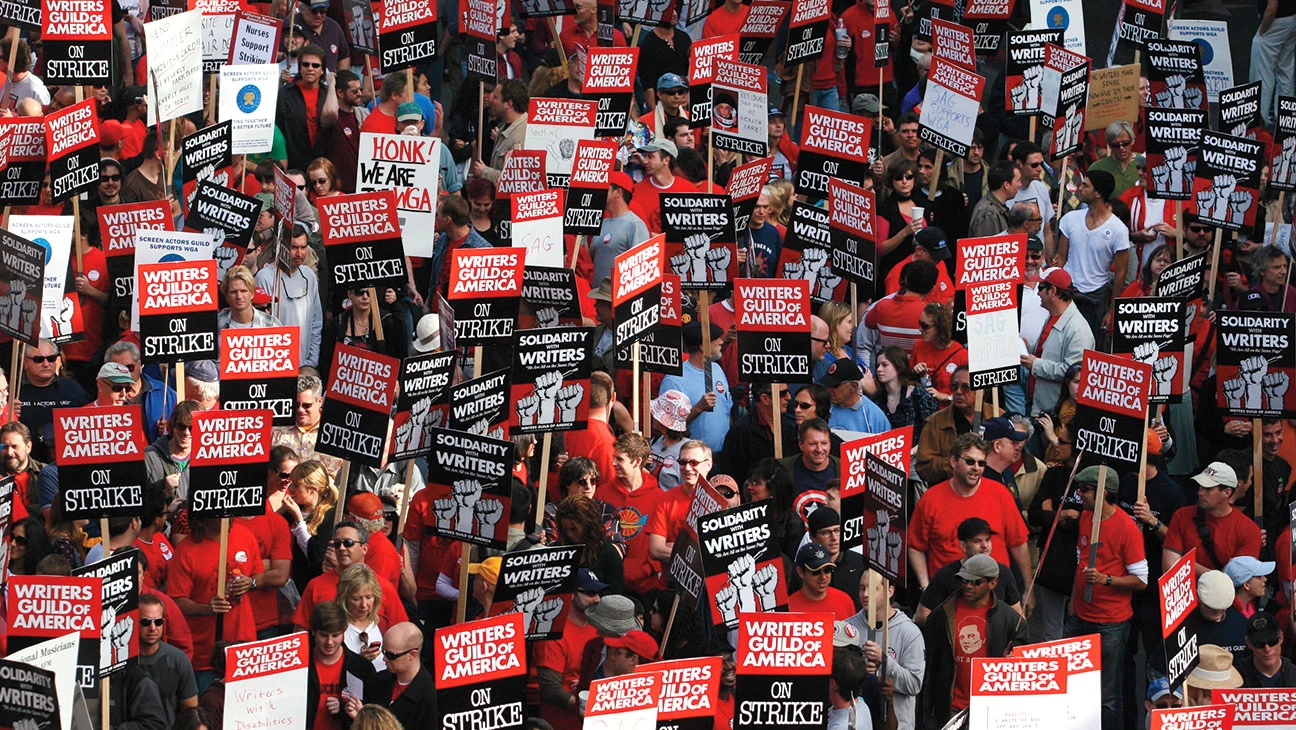Writers Strike Back: the bleak uncertainty of TV – Emi S
The industry of film and television is constantly changing, having to adapt to developing technology, a rise in competition, and our demand for more short-form content (yes, I feel like TikTok is ruining my attention span). Though many may associate those in Hollywood = being filthy rich, according to a WGA member survey: writers’ pay has decreased 14% in 5 years and writer-producers’ pay has decreased 23% in less than 10 years. Writers have increasingly been experiencing fickle job security, being undervalued and treated as disposable, and a lack of agency.
So yes, another strike.
But what’s actually being affected by the WGA strike? Many major shows such as Stranger Things, The Last of Us, The Handmaid’s Tale and Family Guy have all been put on pause, as well as the Game of Thrones and Lord of the Rings spinoffs. Even every major late night show in the US has been put on hold due to ongoing negotiations between the Writer’s Guild of America (WGA) and the Alliance of Motion Picture and Television Producers (AMPTP).
During the 2007-08 writers’ strike, the effects were certainly made known. Many TV shows were put on hold, and those that remained continued with empty shells of the shows that they once were. Others had to rush season finales, receiving bad reception, and even films suffered similarly – for example, the producers of the James Bond story ‘Quantum of Solace’ had Daniel Craig improvise many of his lines, with very little direction, leading to negative reviews and a film that the franchise would rather forget.

The WGA is fighting mainly for:
- Increased writers’ room staffing
- Guaranteed weeks of work
- Viewership-based residuals on streaming
- Expanded pension and health contributions
Viewership-based residuals on streaming:
Despite cable television becoming less and less popular in the 21st century, many higher-ups in the film and TV industry tend to cling onto the belief that streaming services are simply a less popular alternative to cable TV, and are not in direct competition. However, with younger generations relying more and more on streaming services as their main source of film & TV, this is simply no longer the case. The WGA’s demand for viewership-based residuals on streaming is derived from the shift from cable network television to TV created by streaming services – when shows re-air on cable TV, writers continue to get paid each time their programme airs. However, on streaming services, writers do not gain any of these benefits despite potentially being the main cause of more subscription to the streaming service itself.
Increased writers’ room staffing:
Many producers have drastically reduced the size of writing rooms, leading to a number of problems including minimised job security and compromised quality of the product. By reducing the size of writing rooms, writers are treated as disposable, their contracts often ending before production even begins. This raises massive issues in terms of the quality of the final product, as without writers on hand being able to quickly analyse and determine smooth and effective rewrites at the time of filming, the quality of the final product can be reduced drastically. The producers are often left to their own devices, without an exhaustive knowledge of the story and script, which becomes an issue when faced with time and quality pressures; the original creative minds are ripped from their own project before they can even begin to see it come to fruition.

One argument that has been circulating social media is that we simply don’t need writers anymore – we have AI. Twitter loves the idea of ChatGPT, calling for its inclusion in this discussion. But this is a frankly stupid and ignorant argument. Here’s why:
- You pay for what you get. True, AI is much cheaper than having to pay individual writers to script a season of Succession, but why is this even being considered? The reason shows like Succession are so good is because people wrote them – not AI. AI can be shockingly competent, but it can’t compare to hand-crafted art of the highest degree (which Succession obviously is). Ask ChatGPT to write you a season finale and see if it even begins to compare.
- “Writers today lack originality.” Want more originality? Watch something other than the ninth Marvel film that’s come out this year. Over the course of the last decade, so many new and exciting TV shows have gained a significant amount of popularity. You can argue that no one has ever had an original thought in their lives – everything you express being a collection of your experiences and memories – but taking inspiration from personal experiences and feelings that really resonate with others is a great deal more original that whatever a glorified search engine can come up with. (Imagine an AI trying to calculate the nuances and complexities of symbols that evoke meaning in Better Call Saul, for example – it’s laughable.)
- Apply this mindset universally. Kant’s ethics suggests that if a rule can be applied universally with an overall benefit, it is a legitimately good rule. If AI replaces the entire workforce in every sector – what will be left? Our society would crumble. And to think this is being suggested for a career that relies upon creative thought and imagination… the WGA’s feeling of being undervalued only becomes more prominent.
- AI undermines the point of art. Writers are human, and art is essentially an expression of life, of humanity. Creating a methodical algorithm to calculate what would make the most profitable TV show is simply missing the point.
So why should you care about this? After all, yet another strike in the midst of our seemingly spiralling economy is not new. To put it lightly, it is clear to see that without writers the film and TV industry would be a soulless chasm of images, appealing to the eye but rarely making the space up between the screen and the viewer. These strikes are directly detrimental to the quality of the shows that are currently being produced, and ultimately, this is a good thing. The film and TV industry is such a core part of our society, and proving that writers are integral to this will allow for better treatment, therefore better shows, therefore healthier industry. What the AMPTP doesn’t seem to understand is that profit comes under this bracket too – they simply aren’t willing to pay more than the bare minimum. During the 2007-08 writers’ strike, hundreds of millions of dollars were lost in revenue, so it’s certainly strange to see them not learning from their mistakes and devaluing the core of what rakes in the profit they so deeply desire.















0 comments